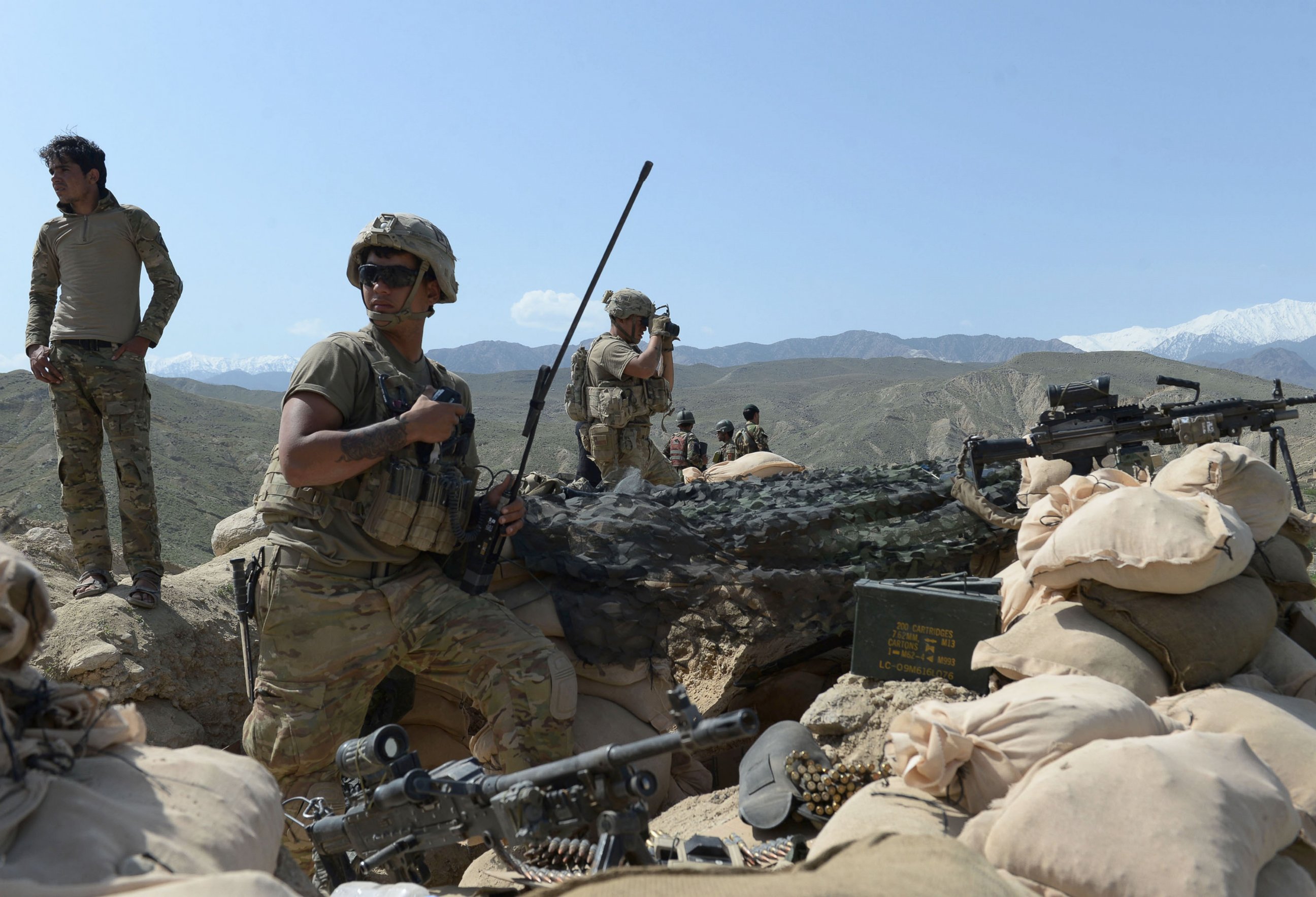ANALYSIS: US continues to face casualties as Trump admin. debates way ahead in Afghanistan
The U.S. has suffered seven casualties in Afghanistan this year.
— -- The death of two U.S. soldiers in Afghanistan Wednesday served as yet another reminder of how the violent sixteen-year conflict is still costing American lives.
One soldier died in July, three in June, making for a total of nine U.S. casualties for all of 2017.
These are small numbers compared to earlier years in the war, especially between 2009 and 2012 when the U.S. would lose as many as 30 to 60 troops in any given month.
But they also mean that by early August, the U.S. has already lost as many service members as it did in all of 2016. Afghan civilian casualties are at an all-time high, according to the United Nations -- grim statistics as the Trump administration is on the verge of announcing a new strategy for the region.

An estimated 8,400 U.S. troops are serving in Afghanistan right now, where they train and advise the Afghan military in the fight against the Taliban and the ISIS affiliate in that country. That mission began in 2015 after the conclusion of official combat operations in 2014.
Now, the Pentagon is weighing sending in as many as 4,000 additional U.S. troops to Afghanistan as part of a revised "South Asia Strategy." In June, President Trump granted Defense Secretary James Mattis the authority to set troop levels in the country, matching a similar responsibility the defense chief was given in April for troop levels in Iraq and Syria.
Mattis told the Senate Armed Services Committee that the new Afghan plan could be expected "mid-July," but it hasn't been announced yet.
NBC News reported on Wednesday that Trump complained to top generals during a recent meeting in the Situation Room that the U.S. wasn't winning in Afghanistan. According to the report, Trump also suggested replacing Gen. John Nicholson, the commander of U.S. forces there.
Sen. John McCain rushed to Nicholson's defense, saying in a statement on Thursday that commanders in the field are not responsible for the failure in Afghanistan.
“Six months ago, General Nicholson testified before the Senate Armed Services Committee and warned that the United States was not winning the war in Afghanistan," the chairman of the Senate Armed Services Committee said. "The reason for this failure is a lack of successful policy and strategic guidance from Washington over many years, which has continued in the first several months of this new administration. Our commanders-in-chief, not our commanders in the field, are responsible for this failure."
McCain went on to say that without a clear strategy from the White House, he would introduce his own plan come September.
Multiple fights
The U.S. faces several extremist groups in Afghanistan, including the Taliban and ISIS.
After months of incremental gains, the Taliban has lost some territory halfway through this year’s fighting season -- often resorting to false social media claims of U.S. casualties to distract from battlefield losses.
Afghan National Defense and Security Forces, advised by U.S. Marines, retook Nawa District from the Taliban last month. But it remains to be seen if Afghan forces will be able to hold the territory they manage to recapture -- or lose it again to this relentless enemy.
For their part, the Taliban continues to launch attacks against U.S. and coalition troops and the Afghan population.
The group took responsibility for the attack on the NATO convoy that killed two U.S. soldiers and wounded four others on Wednesday, as well as a suicide bomb in Kabul that killed over 30 civilians last week.
There has been greater success against ISIS, whose numbers are declining, according to the Pentagon.
Three months into office, Trump green-lighted the use of the most powerful non-nuclear weapon ever used in combat, nicknamed the “mother of all bombs.” The 22,000-pound GBU-43, or massive ordnance air blast (MOAB) bomb, was dropped on a complex of ISIS-controlled caves in eastern Afghanistan in April.
In July, the U.S. took out the third emir of ISIS in Afghanistan, Abu Sayed, after killing the second emir in April. The senior director of the group's media production was killed in Afghanistan in June.
Like with the fight against the Taliban, battlefield successes over ISIS are often countered with deadly attacks on civilians. On Tuesday, an ISIS suicide bomber killed nearly 30 people at a Shiite mosque in Herat province.
The United Nations said last month that the number of civilian deaths in Afghanistan reached a record high with over 400 children killed in the first six months of 2017 alone. Two-thirds of civilian deaths were attributed to the Taliban and other terrorist organizations like ISIS.
So can the addition of several thousand American troops change the tide of a war that three U.S. presidents have struggled to end?
U.S. officials say the new South Asia strategy will be different than previous troop surges because of increased cooperation with regional partners like Pakistan. But Pakistan has proven to be a difficult partner at best, often hamstringing or even countering U.S. efforts, and it’s unclear how the Trump administration could change that.
Just last month, the Pentagon decided to withhold $50 million of military reimbursements from the Pakistani government in fiscal year 2016 after Mattis told Congress that the country had taken insufficient actions against the Haqqani Network, which the U.S. considers a terrorist organization.
A spokesman for the Pentagon said the decision did not "prejudge the conclusions of the White House review of South Asia strategy, which is still ongoing."
ABC News' Adam Kelsey and Luis Martinez contributed to this report.




